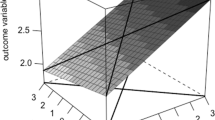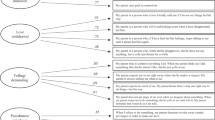Abstract
Research examining environmental factorsassociated with adolescents' life satisfaction(LS) has revealed that familial variables(e.g., parent-child conflict, familystructure) are crucial correlates. Thepurpose of the current study was to identifyparticular dimensions of authoritativeparenting (strictness-supervision, socialsupport/involvement, and psychological autonomygranting) that are related to LS during early,middle, and late adolescence, as well as toexplore the hypothesis that LS serves as amediator between authoritative parenting andadolescent internalizing and externalizingbehavior. A sample of 1201 middle and highschool students completed self-report measuresassessing these constructs. Results indicatedstatistically significant relationships betweeneach authoritative parenting dimension andadolescent LS. Although all three parentingdimensions were positively related to LS,perceived parental social support emerged asthe strongest correlate. Importantdevelopmental differences were revealed,including the finding that the associationbetween parenting behaviors and adolescents' LSchanged as children aged. Last, LS fullymediated the relationship between socialsupport and adolescent problem behavior andpartially mediated relationships between theremaining authoritative parenting dimensions(i.e., strictness-supervision, psychologicalautonomy granting) and maladaptive adolescentbehavior.
Similar content being viewed by others
REFERENCES
Achenbach, T.M. and C.S. Edelbrock: 1991, Child Behavior Checklist and Youth Self-Report (Author, Burlington, VT).
Adelman, H., L. Taylor and P. Nelson: 1989, ‘Minors' dissatisfaction with their life circumstances’, Child Psychiatry and Human Development 20(2), pp. 135-147.
Barber, B.K., J.E. Olsen and S.C. Shagle: 1994, ‘Associations between parental psychological and behavioral control and youth internalized and externalized behavior’, Child Development 65, pp. 1120-1136.
Baron, R.M. and D.A. Kenny: 1986, ‘The moderator-mediator variable distinction in social psychology research: Conceptual, strategic, and statistical considerations’, Journal of Personality and Social Psychology 51, pp. 1173-1182.
Baumrind, D.: 1991, ‘The influence of parenting style on adolescent competence and substance use’, Journal of Early Adolescence 11, pp. 56-95.
Bender, T.A.: 1997, ‘Assessment of subjective well-being during childhood and adolescence’, in G.D. Phye (ed.), Handbook of Classroom Assessment: Learning, Achievement, and Adjustment (Academic Press, San Diego, CA), pp. 199-225.
Brendgen, M., F. Vitaro and W.M. Bukowski: 1998, ‘Affiliation with delinquent friends: Contributions of parents, self-esteem, delinquent behavior, and rejection by peers’, Journal of Early Adolescence 18(3), pp. 244-265.
Burke, R.J. and T. Weir: 1978, ‘Benefits to adolescents of informal helping relationships with their parents and peers’, Psychological Reports 42(3), pp. 1175-1184.
Burke, R.J. and T. Weir: 1979, ‘Helping responses of parents and peers and adolescent well-being’, The Journal of Psychology 102(1), pp. 49-62.
Cobb, N.J.: 1998, Adolescence: Continuity, Change, and Diversity, 3rd edition (Mayfield Publishing Company, Mountain View, CA).
Cohen, J., P. Cohen, S.G. West and L.S. Aiken: 2003, Applied Multiple Regression/Correlation Analysis for the Behavioral Sciences, 3rd edition (Erlbaum, Mahwah, NJ).
Demo, D.H. and A.C. Acock: 1996, ‘Family structure, family process, and adolescent well-being’, Journal of Research on Adolescence 6(4), pp. 457-488.
Dew, T. and E.S. Huebner: 1994, ‘Adolescents' perceived quality of life: An exploratory investigation’, Journal of School Psychology 33(2), pp. 185-199.
Diener, E.: 1994, ‘Assessing subjective well-being: Progress and opportunities’, Social Indicators Research 31, pp. 103-157.
Diener, E.: 2000, ‘Subjective well-being: The science of happiness and a proposal for a national index’, American Psychologist 55(1), pp. 34-43.
DuBois, D.L., R.D. Felner, M.D. Sherman and C.A. Bull: 1994, ‘Socioenvironmental experiences, self-esteem, and emotional/behavioral problems in early adolescence’, American Journal of Community Psychology 22(3), pp. 371-397.
Frisch, M.B.: 2000, ‘Improving mental and physical health care through quality of life therapy and assessment’, in E. Diener and D.R. Rahtz (eds.), Advances in Quality of Life Theory and Research (Kluwer Academic Press: Great Britain), pp. 207-241.
Gilman, R. and E.S. Huebner: 1997, ‘Children's reports of their life satisfaction’, School Psychology International 18, pp. 229-243.
Gray, M.R. and L. Steinberg: 1999, ‘Unpacking authoritative parenting: Reassessing a multidimensional construct’, Journal of Marriage and the Family 61, pp. 574-587.
Grossman, M. and K.M. Rowat: 1995, ‘Parental relationships, coping strategies, received support and well-being in adolescents of separated or divorced and married parents’, Research in Nursing &; Health 18, pp. 249-261.
Heaven, P.C.L.: 1989, ‘Extraversion, neuroticism, and satisfaction with life among adolescents’, Personality and Individual Differences 10(5), pp. 489-492.
Holmbeck, G.N.: 1997, ‘Toward terminological, conceptual, and statistical clarity in the study of mediators and moderators: Examples from the child-clinical and pediatric psychology literatures’, Journal of Clinical and Consulting Psychology 65, pp. 599-610.
Homel, R. and A. Burns: 1989, ‘Environmental quality and the wellbeing of children’, Social Indicators Research 21, pp. 133-158.
Huebner, E.S.: 1991a, ‘Correlates of life satisfaction in children’, School Psychology Quarterly 6(2), pp. 103-111.
Huebner, E.S.: 1991b, ‘Initial development of the Students' Life Satisfaction Scale’, School Psychology International 12, pp. 231-240.
Huebner, E.S. and G.L. Alderman: 1993, ‘Convergent and discriminant validation of a children's life satisfaction scale: Its relationship to self-and teacher-reported psychological problems and school functioning’, Social Indicators Research 30, pp. 71-82.
Lamborn, S.D., N.S. Mounts, L. Steinberg and S.M. Dornbusch: 1991, ‘Patterns of competence and adjustment among adolescents from authoritative, authoritarian, indulgent, and neglectful families’, Child Development 62, pp. 1049-1065.
Lazurus, R.S.: 1991, Emotion and Adaptation (Oxford University Press, New York).
Leung, J. P. and K. Leung: 1992, ‘Life satisfaction, self-concept, and relationship with parents in adolescence’, Journal of Youth and Adolescence 21(6), pp. 653-665.
Leung, J.P. and L.W. Zhang: 2000, ‘Modeling life satisfaction of Chinese adolescents in Hong Kong’, International Journal of Behavioral Development 24, pp. 99-104.
Liebkind, K. and I. Jasinskaja-Lahti: 2000, ‘Acculturation and psychological well-being among immigrant adolescents in Finland: A comparative study of adolescents from different cultural backgrounds’, Journal of Adolescent Research 15(4), pp. 446-469.
Man, P.: 1991, ‘The influence of peers and parents on youth life satisfaction in Hong Kong’, Social Indicators Research 24, pp. 347-365.
McCullough, G., E.S. Huebner and J.E. Laughlin: 2000, ‘Life events, self-concept, and adolescents positive subjective well-being’, Psychology in the Schools 37, pp. 1-10.
McFarlane, A.H., A. Bellissimo and G.R. Norman: 1995, ‘Family structure, family functioning and adolescent well-being: The transcendent influence of parental style’, Journal of Child Psychology and Psychiatry 36(5), pp. 847-864.
Patterson, G.R. and M. Stouthamer-Loeber: 1984, ‘The correlation of family management practices and delinquency’, Child Development 55(4), pp. 1299-1307.
Petito, F. and R.A. Cummins: 2000, ‘Quality of life in adolescence: The role of perceived control, parenting style and social support’, Behaviour Change 17, pp. 196-207.
Sam, D.L.: 1998, ‘Predicting life satisfaction among adolescents from immigrant families in Norway’, Ethnicity &; Health 3, pp. 5-18.
Sastre, M.T.M. and G. Ferriere: 2000, ‘Family “decline” and the subjective well-being of adolescent’, Social Indicators Research 49, pp. 69-82.
Schaefer, E.S.: 1965, ‘Children's reports of parental behavior: An inventory’, Child Development 36, pp. 413-424.
Seibel, F.L and W.B. Johnson: 2001, ‘Parental control, trait anxiety, and satisfaction with life in college students’, Psychological Reports 88, pp. 473-480.
Shagle, S.C. and B.K. Barber: 1995, ‘A social-ecological analysis of adolescent suicidal ideation’, American Journal of Orthopsychiatry 65, pp. 114-124.
Shek, D.T.L.: 1997a, ‘The relation of family functioning to adolescent psychological well-being, school adjustment, and problem behavior’, The Journal of Genetic Psychology 158(4), pp. 467-479.
Shek, D.T.L.: 1997b, ‘The relation of parent-adolescent conflict to adolescent psychological well-being, school adjustment, and problem behavior’, Social Behavior and Personality 25(3), pp. 277-290.
Shek, D.T.L.: 1999, ‘Individual and dyadic predictors of family functioning in a chinese context’, The American Journal of Family Therapy 27, pp. 49-61.
Smollar, J. and J. Youniss: 1989, ‘Transformations in adolescents' perceptions of parents’, International Journal of Behavioral Development 12(1), pp. 71-84.
Stein, J.A. and M.D. Newcomb: 1999, ‘Adult outcomes of adolescent conventional and agentic orientations: A 20-year longitudinal study’, Journal of Early Adolescence 19(1), pp. 39-65.
Steinberg, L., J.D. Elman and M.S. Mounts: 1989, ‘Authoritative parenting, psychosocial maturity, and academic success among adolescents’, Child Development 60, pp. 1424-1436.
Steinberg, L., S.D. Lamborn, S.M. Dornbusch and N. Darling: 1992, ‘Impact of parenting practices on adolescent achievement: Authoritative parenting, school involvement, and encouragement to succeed’, Child Development 63, pp. 1266-1281.
Steinberg, L., N.S. Mounts, S.D. Lamborn and S.M. Dornbusch: 1991, ‘Authoritative parenting and adolescent adjustment across varied ecological niches’, Journal of Research on Adolescence 1(1), pp. 19-36.
Stevenson, W., K.I. Maton and D.M. Teti: 1999, ‘Social support, relationship quality, and well-being among pregnant adolescents’, Journal of Adolescence 22, pp. 109-121.
Veenhoven, R.: 1989, How Harmful Is Happiness? (Universitaire Pers Rotterdam, Rotterdam).
Wills, T.A., E.A. Blechman and G. McNamara: 1996a, ‘Family support, coping, and competence’, in E.M. Hetherington and E.A. Blechman (eds.), Stress, Coping, and Resiliency in Children and Families (Lawrence Erlbaum Associates, Mahwah, NJ), pp. 107-133.
Wills, T.A. and S.D. Cleary: 1996b, ‘How are social support effects mediated: A test for parental support and adolescent substance use’, Journal of Personality and Social Psychology 71, pp. 937-952.
Wilson, S.M., C.S. Henry and G.W. Peterson: 1997, ‘Life satisfaction among low-income rural youth from Appalachia’, Journal of Adolescence 20, pp. 443-459.
Wong, M.M. and M. Csikszentmihalyi: 1991, ‘Motivation and academic achievement: The effects of personality traits and the quality of experience’, Journal of Personality 59(3), pp. 539-574.
Young, M.H., B.C. Miller, M.C. Norton and E.J. Hill: 1995, ‘The effect of parental supportive behaviors on life satisfaction of adolescent offspring’, Journal of Marriage and Family 57, pp. 813-822.
Zimmerman, M.A., D.A. Salem and K.I. Maton: 1995, ‘Family structure and psychosocial correlates among urban African-American adolescent males’, Child Development 66, pp. 1598-1613.
Author information
Authors and Affiliations
Rights and permissions
About this article
Cite this article
Suldo, S.M., Huebner, E.S. The Role of Life Satisfaction in the Relationship between Authoritative Parenting Dimensions and Adolescent Problem Behavior. Social Indicators Research 66, 165–195 (2004). https://doi.org/10.1023/B:SOCI.0000007498.62080.1e
Issue Date:
DOI: https://doi.org/10.1023/B:SOCI.0000007498.62080.1e




